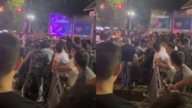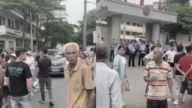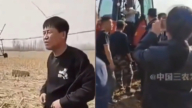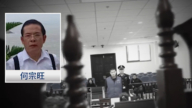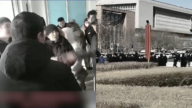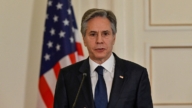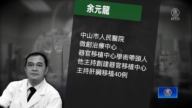【新唐人2013年05月18日讯】中共当局最近以政治重罪集体打击维权人士。江西新余市公民刘萍、魏忠平和李思华,日前相继被当地警方以涉嫌“煽动颠覆国家政权罪”刑事拘留。刘萍等五人是因为举牌要求官员公示财产,以及声援北京、广东两地被当局关押的人士而遭到警方拘押,其中两人已被低调释放。目前,三人集体被控涉嫌“煽动颠覆国家政权罪”,被认为是中共维稳的罕见举动,以及当局维稳升级的讯号。
刘萍、和魏忠平及李思华三人被抓之前,曾举牌要求官员公示财产,并要求释放北京等地举牌被抓的人士。
一名大陆钱姓网友对于中共刑拘刘萍等三人,感到非常愤怒。他向《新唐人》表示,中共当局是“欲加之罪,何患无词”。
网友钱先生:“魏忠平和刘萍他们一开始是根据中国的法律竞选人大代表,当时受到了很多的阻拦,然后,刘萍和魏忠平又帮助一些下岗的工人维权,包括一些新的钢铁厂的工人,为了老百姓的利益,去帮助大伙儿争取自己的权益。”
钱先生希望江西新余当局尽快放人。
“权利运动”负责人胡军:“刘萍当时还没有要求七常委公布财产,但北京那个是要求七常委公布财产。她那是要求官员公布财产。北京没有直接定煽动颠覆国家政权罪,江西定的话,我觉得,肯定是他们当地政府定这个罪名。这个案子就证明了中共财产来源非法,否则就应该放弃这个审理。”
深圳律师庞琨是李思华的辩护律师,5月16号,庞琨告诉《美国之音》,作为代理律师,他至今还无法获知李思华被刑拘的确切原因。他说,他当天向新余警方了解当事人的犯罪事实,但是遭到拒绝。
江苏东南大学法学院教授张赞宁:“那刑事诉讼法明确规定,律师可以会见,有权会见。所谓颠覆国家政权,只有用武装才能颠覆,刘萍只不过是要求一个公民的权利,要求有选举权,就以颠覆国家政权罪把她抓起来,这是毫无道理的。那说明现在当局还是维护独裁统治。”
南京律师张赞宁认为,按照中共领导人习近平的讲法:要建设法制国家,实现宪政,但是现在的做法,却跟习近平的讲话背道而驰。
“权利运动”组织负责人胡军则质疑,中共当局突然大规模抓人,并且以“煽动颠覆国家政权罪”入罪,到底是从哪里出来的决定﹖
胡军:“到底是政法委保守势力在做?还是……习近平要求反腐,反腐最重要的就是财产公示,那么,他又不允许……相互矛盾!如果说硬要起诉这些人,因为财产公示就煽动了国家政权的话,那么,中共高官的财产来源是否是合法的?如果他是非法的话,那么只能说,这个案子就证明了习近平他本身就是一个腐败份子。”
杭州维权律师王成两年前代理过李思华的案子,在新余曾被国保殴打。王成向《美国之音》表示,公民要求官员公开他们的个人财产,这是中国宪法赋予他们的言论自由权利。当局因为公民要求官员公开财产,以重罪拘押公民,是严重违宪做法。
胡军:“中共这个政权被解体,被抛弃的话,并不是这几个刘萍这些人所能为的,真正解体它的,还是它的所作所为造成的整个体制的崩溃。其实很简单,是刘萍的作用大?还是王立军跑美国领事馆的作用大?还是薄熙来的作用大?”
北京社会活动人士胡佳也指出,当局以政治重罪集体打击维权人士,是维稳手段的升级,目地是借着“煽颠罪”罪名,打击公民行动组织化和街头化。
采访/朱智善 编辑/周平 后制/李勇
The Chinese Communist Party Detains 3 Rights Activists for Political Crimes
The Chinese Communist Party (CCP) authorities have
recently charged human rights activists with political crimes.
Liu Ping, Wei Zhongping, and Li Sihua
are citizens of Xinyu city, Jiangxi province.
All were recently placed into detention by local police,
on suspicion of “incitement to subvert state power”.
Liu Ping and four other people were
detained because of holding banners.
They requested officials to publicize their properties, and
supported detained activists in Beijing and Guangdong.
Two of them have been released quietly.
Three activists have been charged
with “incitement to subvert state power”.
This is an uncommon action from the CCP.
The public considers this as a signal that the
regime is stepping up it’s ‘maintaining stability’.
Liu Ping, Wei Zhongping, and Li Sihua held banners
requesting officials to publicize properties, and to
release the activists who held banners in Beijing.
They were subsequently arrested.
A mainland Chinese netizen ‘Qian’ was angry
about the CCP detaining these three activists.
He told NTD that if the CCP wants to find fault with
someone, they don’t worry about finding a suitable pretext.
Mr. Qian, Netizen: “Wei Zhongping and Liu Ping wanted to
participate in the deputy elections, according to Chinese law.
They faced many obstacles.
They also helped some laid-off workers to defend their
rights, including some new workers in a steel plant.
They helped common people to
fight for their rights and benefits.”
Mr. Qian hopes that the Xinyu local
authority will release them soon.
Hu Jun, Head of “Human Rights Campaign in China”:
“Liu Ping didn’t request the 7 standing committee members
to publicize properties at that time, but the one in Beijing did.
She only requested officials to publicize properties.
Beijing authorities haven’t charged her
with ‘incitement to subvert state power’.
If Jiangxi authorities charge her, I think, it must
be the local authorities that give the charge.
They frame the case to target Xi Jinping and other
standing committee members, by kidnapping Liu Ping.
This case indicates that the CCP properties are from
illegal sources, otherwise, they would give up this trial.”
Shenzhen lawyer Pang Kun is defending for Li Sihua.
He told Voice of America, on May 16, that
as Li’s lawyer, it still remained for him to be
informed of the exact reason of Li’s detention.
He said that he requested the facts of the
crime from Xinyu police, but he was rejected.
Professor Zhang Zanning, Southeast University Law School:
“Criminal Procedure Law clearly defines that
the lawyer has the right to see the defendant.
In order to subvert state power, one needs armed forces.
Liu Ping is just a citizen requesting her right to be elected.
It’s unjustified to arrest her with ‘subversion of state power’.
It shows that the authority is still maintaining a dictatorship.”
Zhang Zanning believes that what the regime is
doing now is going against CCP leader Xi Jinping.
Xi called for “building a state of law,
and a constitutional government.”
Hu Jun, questions why the CCP regime has
suddenly arrested people on a large scale.
Hu also wonders where the decision came from, to
charge them with ‘incitement to subvert state power’.
Hu Jun: “Is it the conservative force of the Politics
and Law Committee that has been in charge?
Xi Jinping has called for anti-corruption, and the
most important part of this is to publicize properties.
However, Xi also doesn’t allow it, so it’s conflicting!
If requesting publicizing officials properties
can be called inciting subversion of state power,
I have to question whether high-level
officials’ properties are from illegal sources.
If they are from illegal sources, this case will further
show that Xi Jinping himself is a corrupted official.”
Hangzhou human rights lawyer Wang Cheng
acted on behalf of Li Sihua’s case two years ago.
He was beaten by State Security officers in Xinyu city.
Wang Cheng spoke to Voice of America.
Freedom of expression in China’s constitution
gives Chinese citizens the right to request
officials to publicize their properties.
It is severely against the constitution to charge
citizens with felony, simply because those
citizens wanted officials to publicize properties.
Hu Jun: “Liu Ping and her fellows can’t destroy
the CCP alone, or take down its authority.
It is the collapse of the system that will
truly destroy the CCP. It’s very simple.
Will the effect of Liu Ping’s action have larger ramifications?
Or the effect of when Wang Lijun fled to the
US embassy? Or the effect of Bo Xilai case?”
Beijing activist Hu Jia also says that the regime
charging rights activists with political felony
suggests a heightening of maintaining stability.
It uses “incitement to subvert state power” to suppress
citizens gathering together and holding activities.


